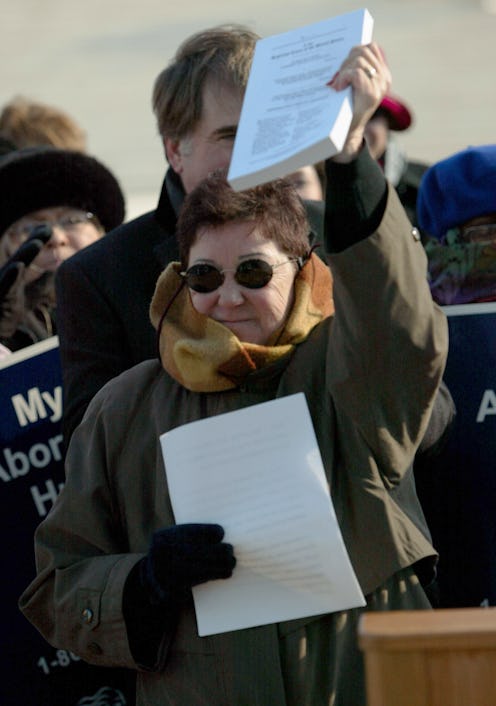News
7 Polarizing Norma McCorvey Quotes

News broke on Saturday afternoon of the passing of Norma McCorvey, the polarizing woman behind Roe v. Wade, the landmark Supreme Court case that made legal abortion a constitutional right. A heart ailment was reportedly the cause of death; McCorvey was 69. She was originally embraced by women's rights activists for her role in the monumental victory for reproductive rights, but after she reversed her and declared herself to be pro-life in 1994, she became a controversial and complex figure for both sides of the debate.
McCorvey's change of mind came as a result of her conversion to Christianity. Not only did her stance on abortion change, but so did her statements regarding her own sexuality (first lived and labeled herself a lesbian, subsequently claimed to no longer be homosexual) and the cause of how she originally got pregnant with the fetus that drove her to filing a lawsuit (initially said she was raped, later described it as a result of what she believed to be love).
Regardless of whether one agrees with her assertions of not, her words were bound to fuel controversy. Here are 7 instances in which McCorvey showed the complicated facets of herself.
1. Jane Roe No More
"Yes, Father, I was the Jane Roe of Roe vs. Wade, but Jane Roe has been laid to rest."
Here, in an interview with Father Frank Pavone, McCorvey disowned her past in one of her most succinct statements regarding the lawsuit and her involvement. "Jane Roe" was a pseudonym McCorvey used to protect her privacy during her legal battle.
2. Assault Or Love?
"I found out I was pregnant through what I thought was love. I went to my doctor. He confirmed that I was pregnant, and I told him that I wanted an abortion, that I did not want to carry bearing on the outcome."
In a 1987 interview with WUSA-TV, McCorvey said her lawyer had concocted the rape claim introduced in Roe v. Wade in order to make her story stronger, and that she went along with it believing that it be in her benefit. In response to being explicitly asked if she was raped, she said, "No, I wasn't." She went further to describe it as what she "thought was love." In a world where the unfounded fear of false rape accusations was, and remains, rampant, McCorvey's statement undoubtedly provides fodder for those determined to continue spreading this anxiety.
3. Bloodshed Touching Bloodshed
Despite believing abortion to be murder, McCorvey opposed the violent sector of the anti-abortion movement. In the interview above, McCorvey touches on the sympathy she felt for Dr. George Tiller, an abortion provider who was assassinated in 2009.
4. Complete Conversion
"I am not a lesbian. I'm just a child in Christ now."
After having lived as a lesbian for decades and having written about it in her autobiography I Am Roe, McCorvey appeared to embrace Christian doctrine when it came to that part of her life as well. She declared to no longer be a lesbian in a 1996 interview.
5. The Beginnings Of Her Doubts
I could understand a woman making one mistake. I could even understand the woman making the same mistake twice. But half-dozen times? I had to get away from her. I couldn’t stand there and talk to her anymore.
In her 1997 autobiography Won by Love, McCorvey describes an encounter she had with a young woman at a pro-choice march, who'd allegedly had five or six abortions and told McCorvey how "cool" it was that she could continue to do so legally. McCorvey follows by describing her judgment of the young woman's decisions, seeming unable to make up her mind regarding the acceptability of terminating pregnancies.
6. Discrediting The Decision
"The entire basis for Roe v. Wade was built upon false assumptions."
Discrediting the entire foundation of her lawsuit and not allowing any aspects of it to be taken as truth, certainly makes her and the court's decision more complicated that it already was.
7. Holocaust Comparisons
It's not a discussion about abortion without the obligatory use of the word "holocaust."
McCorvey will undoubtedly continue to be a complex figure in the history of women's rights.
Images: Washington Post/YouTube (1)